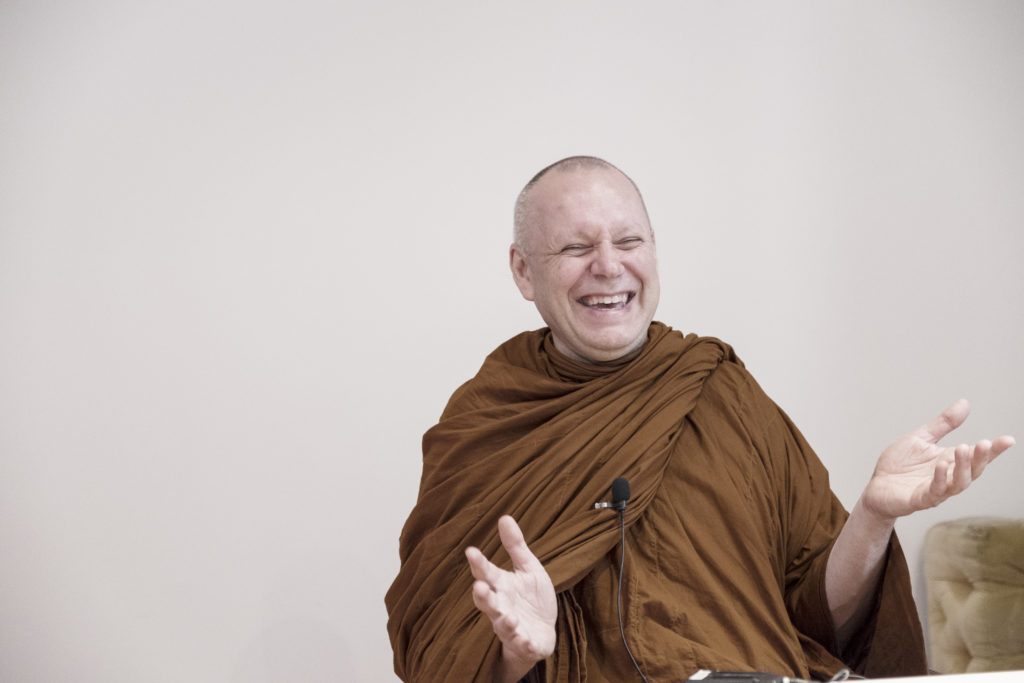Date/Time
Date(s) - 16 May 2021 - 23 May 2021
8:30 am - 9:00 pm
Retreat Description
Everything is conditioned ~ thus spoke the Buddha!
In this 8-day retreat we will be looking at two of the Buddha’s famous causal sequences: dependent origination and dependent liberation, with the main focus on the latter. Together they reveal the entire course of the human experience through and beyond this world, to Nibbana.
Whilst dependent origination details why and how suffering arises, dependent liberation shows how, by coming in contact with and developing confidence in the Buddha’s teachings, that same suffering can take a completely different direction and lead us step by step towards freedom. Dependent liberation (sometimes called “transcendental dependent origination”) is therefore a supremely uplifting teaching that shows how the Path is to be experienced as a sequence of ever deepening joy and peace, ending in the highest liberation.
How do we get this sequence going? And how do we sustain it to the very end? Through their offering of Dhamma reflections, guided meditations and Q&A sessions, Ajahn Brahmali and Venerable Canda will gently guide us in exploring and implementing the supporting conditions for our greatest happiness. Follow the instructions in their fullness and awakening is guaranteed!
This very special “dual Sangha” (bhikkhu and bhikkhuni- led) retreat is the first time Ajahn Brahmali and Ven Canda are teaching a retreat together. It will include three sessions of one and a half hours each: a morning and an early afternoon session with Ajahn Brahmali and an evening session with Ven Canda.
Dependent Origination and Dependent Liberation in the Suttas
Here are some brief passages to give you a taste of some of the teachings that Ajahn Brahmali will expand on during the retreat and that you may wish to explore in advance:
Samyutta Nikaya 12.1 (Dependent Origination) translated by Bhikkhu Bodhi
“And what, bhikkhus, is dependent origination? With ignorance as condition, volitional formations come to be; with volitional formations as condition, consciousness; with consciousness as condition, name-and-form; with name-and-form as condition, the six sense bases; with the six sense bases as condition, contact; with contact as condition, feeling; with feeling as condition, craving; with craving as condition, clinging; with clinging as condition, existence; with existence as condition, birth; with birth as condition, aging-and-death, sorrow, lamentation, pain, displeasure, and despair come to be. Such is the origin of this whole mass of suffering. This, bhikkhus, is called dependent origination.”
Samyutta Nikaya 12.23 (Proximate Cause) ~ slightly adapted from Bhikkhu Bodhi’s translation by Ven Canda
“I say, bhikkhus, that the knowledge of destruction of the out-flowings (khayeñāṇaṃ) has a proximate cause; it does not lack a proximate cause. And what is the proximate cause for the knowledge of destruction of the out-flowings? It should be said: liberation.
“I say, bhikkhus, that liberation (vimuttī) too has a proximate cause; it does not lack a proximate cause. And what is the proximate cause for liberation? It should be said: fading away.
“I say, bhikkhus, that fading away (viraga) too has a proximate cause; it does not lack a proximate cause. And what is the proximate cause for fading away? It should be said: revulsion.
“I say, bhikkhus, that revulsion (nibbida) too has a proximate cause; it does not lack a proximate cause. And what is the proximate cause for revulsion? It should be said: the knowledge and vision of things as they really are.
“I say, bhikkhus, that the knowledge and vision of things as they really are (yathābhūtañāṇadassana) too has a proximate cause; it does not lack a proximate cause. And what is the proximate cause for the knowledge and vision of things as they really are? It should be said: stillness.
“I say, bhikkhus, that stillness (samadhi) too has a proximate cause; it does not lack a proximate cause. And what is the proximate cause for stillness? It should be said: happiness.
“I say, bhikkhus, that happiness (sukha) too has a proximate cause; it does not lack a proximate cause. And what is the proximate cause for happiness? It should be said: tranquillity.
“I say, bhikkhus, that tranquillity (passaddhī) too has a proximate cause; it does not lack a proximate cause. And what is the proximate cause for tranquillity? It should be said: bliss.
“I say, bhikkhus, that bliss (pītī) too has a proximate cause; it does not lack a proximate cause. And what is the proximate cause for bliss? It should be said: joy.
“I say, bhikkhus, that joy (pāmojja) too has a proximate cause; it does not lack a proximate cause. And what is the proximate cause for joy? It should be said: confidence.
“I say, bhikkhus, that confidence (saddha) too has a proximate cause; it does not lack a proximate cause. And what is the proximate cause for confidence? It should be said: suffering (dukkha).”
Biography of Ajahn Brahmali

Born in Norway in 1964, Ajahn Brahmali felt a strong calling to Buddhism and meditation in his early 20’s after a visit to Japan. Having completed master degrees in engineering and finance, he began his monastic training as an Anagarika in England at Amaravati and Chithurst Buddhist Monasteries.
In 1994, after hearing a teaching by Ajahn Brahm, he moved to Australia to train at Bodhinyana Monastery. He took full ordination as a bhikkhu with Ajahn Brahm as preceptor in 1996 and has now been a monk for twenty four years.
Ajahn Brahmali is a powerfully effective teacher of meditation who draws his inspiration primarily from the Early Buddhist Texts (as well as from Ajahn Brahm of course!). He also teaches Pali language and the monastic training rules to monks at Bodhinyana Monastery ~ and to bhikkhunis at Dhammasara Nuns’ Monastery as well as overseas. His lucidly inspiring talks bring the Buddha’s teachings alive, and are very popular downloads on the BSWA YouTube channel.
Ajahn Brahmali also played an instrumental role in the first Theravada bhikkhuni ordinations in Perth, in 2009, and is a much sought after teacher internationally.
Biography of Ven Canda

Ven Canda came into contact with the Buddha’s teachings in India in 1996 at the age of twenty, through the Vipassana tradition as taught by S.N. Goenka. During her first retreat she decided to devote the rest of her life to ending suffering through practising the Buddha’s teachings.
For the next seven years she meditated and gave service on numerous retreats, mostly in India and Nepal, as her aspiration to renounce lay-life intensified. However, ordination opportunities for women were so rare that she was unable to find a suitable monastery. Eventually, in 2004 she discovered a monastery in rural Burma and though engaged in studies, she took temporary ordination with Sayadaw U Paññajota, during the summer holidays. In 2006, after graduating in Ayurvedic Medicine with first class honours, she returned to ordain for the long run. During this time Ven Canda encountered the Thai Forest Tradition through Ajahn Mahaboowa in Thailand, and became increasingly drawn to samadhi as a means to develop deeper insight.
By 2010 the ascetic lifestyle, climate and diet in Burma had taken its toll on Ven Canda’s health, leading to a return to the West. This happily coincided with the chance discovery of Ajahn Brahm’s teachings. His emphasis on love, kindness and letting go resonated deeply and immediately and learning directly from him became a new goal. After 2 years as a wandering nun in Europe, Ven Canda finally got the opportunity to travel to Australia in 2012. She joined the Dhammasara community in Perth and took Bhikkhuni ordination in April 2014, with Ayya Santini as preceptor.
In October 2015 Ajahn Brahm asked Ven Canda to establish a monastery in UK, to give women the opportunity to train towards full ordination. In 2016, she founded Anukampa Bhikkhuni Project with an aim to establish Britain’s first Forest Monastery for bhikkhunis.
Ven Canda’s teachings emphasise kindness and letting go as a way to deepen samadhi (stillness) and pave the path to wisdom. Her style is warm, engaging and richly informed by the pragmatism of early Buddhist texts. Her popular “Zoomi Bhikkhuni” sessions are eagerly received by a regular group of devoted disciples.
The Ethical Precepts
Venerable Ānanda once asked the Buddha, “Venerable, what is the purpose and benefit of skillful ethics (sila)?” The Buddha answered, “So, Ānanda, the purpose and benefit of skillful ethics is not having regrets (avippati). The purpose and benefit of not having regrets is joy (pamojja). The purpose and benefit of joy is bliss (piti). The purpose and benefit of bliss is tranquillity (passaddhi). The purpose and benefit of tranquillity is happiness (sukha). The purpose and benefit of happiness is stillness (samadhi). The purpose and benefit of stillness is seeing things as they truly are. The purpose and benefit of seeing things as they truly are is revulsion (nibbida). The purpose and benefit of revulsion is dispassion or fading away (viraga). The purpose and benefit of dispassion is knowledge and vision of liberation (vimuttinyanadassana). So, Ānanda, skillful ethics progressively leads up to the highest.” (Anguttara Nikaya 11.1)
Here we can see how practicing ethical precepts creates a strong foundation for the development of deep meditation. We therefore strongly encourage you to take the precepts – and you may choose whether you wish to observe the five or the eight, during the retreat.
The Five Precepts – Pañcasīla
-
I undertake the training-precept to abstain from killing living beings.Pāṇātipātā veramaṇī sikkhāpadaṃ samādiyāmi.
-
I undertake the training-precept to abstain from taking what is not given.Adinnādānā veramaṇī sikkhāpadaṃ samādiyāmi.
-
I undertake the training-precept to abstain from sexual misconduct.Kāmesu micchācārā veramaṇī sikkhāpadaṃ samādiyāmi.
-
I undertake the training-precept to abstain from false speech.Musāvādā veramaṇī sikkhāpadaṃ samādiyāmi.
-
I undertake the training-precept to abstain from alcoholic drink or drugs that cloud the mind and cause heedlessness.Surā meraya majja pamādaṭṭhānā veramaṇī sikkhāpadaṃ samādiyāmi.
The Eight Precepts – Aṭṭhaṅgasīla
-
I undertake the training-precept to abstain from killing living beings.Pāṇātipātā veramaṇī sikkhāpadaṃ samādiyāmi.
-
I undertake the training-precept to abstain from taking what is not given.Adinnādānā veramaṇī sikkhāpadaṃ samādiyāmi.
-
I undertake the training-precept to abstain from sexual conduct.Abrahmacariyā veramaṇī sikkhāpadaṃ samādiyāmi.
-
I undertake the training-precept to abstain from false speech.Musāvādā veramaṇī sikkhāpadaṃ samādiyāmi.
-
I undertake the training-precept to abstain from alcoholic drink or drugs that cloud the mind and cause heedlessness.Surā meraya majja pamādaṭṭhānā veramaṇī sikkhāpadaṃ samādiyāmi.
-
I undertake the training-precept to abstain from eating at the wrong time (after solar noon).Vikāla bhojanā veramaṇī sikkhāpadaṃ samādiyāmi.
-
I undertake the training-precept to abstain from dancing, singing, music, going to see entertainments, wearing jewellery, using perfumes, and beautifying the body with cosmetics.Nacca gīta vādita visūkadassanā mālā gandha vilepana dhārana maṇḍana vibhūsanaṭṭhānā veramaṇī sikkhāpadaṃ samādiyāmi.
-
I undertake the training-precept to abstain from using high or luxurious beds and seats.Uccāsayana mahāsayanā veramaṇī sikkhāpadaṃ samādiyāmi.
Tentative schedule (8:30 on 16th May ~ 15:00 on 23rd May UK time)
The retreat starts at 8:30 on Sunday 16th May, and finishes at 15:00 on Sunday 23rd May. On the last day, there will be an opportunity to share your experience with other retreatants. The schedule is deliberately designed to be spacious and allow for plenty of personal practice time and rest, so that you can take a break from the screen and find a supportive rhythm and pace. You will be guided as to how best to make use of your personal practice time.
08:30 – 10:00 Dhamma talk, guided meditation and precepts (Ajahn Brahmali)
10:00 – 12:00 Lunch for those on 8 precepts
12:00 – 13:30 Sutta study and Q&A (Ajahn Brahmali)
13:30 – 14.30 Lunch or rest
14:30 – 18:00 Personal practice period
17:15 – 18:00 Optional silent group meditation (subject to volunteer availability and time change)
18:00 – 19:15 Tea or dinner
19:30 – 21:00 Short talk, guided meditation and Q&A (Ven Canda)
Full time attendance – including the personal practice period – is necessary for this retreat, so you can experience the full potential of the practice. Due to the timing it will therefore work best for people in the UK and Europe (or the east coast of the US if you are willing to adopt forest monastery time and rise early!) Places are limited to 95, so we kindly ask that if you only want to attend the teacher-led sessions, to please watch them via live-stream, or after we upload them to our YouTube channel.
Check the retreat schedule against your time zone here.
How To Have A Home Retreat
Practicing on a home retreat can be a very rewarding experience. One of the most powerful ways in which it differs from watching online talks, is that you carve out a space dedicated to silent practice with none of the usual distractions and disturbances. Essentially, you take “time out” of ordinary life to delve deeply into your inner world. To support yourself in this process, Noble Silence is encouraged throughout the retreat: to remain in silence as much as possible and to not use any electronic devices, including mobile phones, other than the one you would use for the online Zoom sessions (only!). To help you decide whether this would suit you, we offer some thoughts about the benefits of home retreat and consider some of the potential challenges – as well as possible solutions – so you can make the best use of your time.
Benefits:
- Continuity of practice which helps you get more benefit from meditation
- Safety, intimacy and support of an enclosed group
- Opportunity for personal guidance through questions to the teachers
- Renewed confidence in your ability to practice wherever you are
- The food that suits your tummy and no one snoring in your dorm!
Challenges and solutions:
If you are living alone, you have the ideal hermitage! Turn off your phone, put on the vacation responder and do your weekly shop in advance. Use ear plugs if it is especially noisy and take a walk at the quietest times of day. This will help you immensely in observing Noble Silence and cultivating sense restraint, which inclines the mind toward inner happiness and facilitates quietening the mind.
For most however, home retreat may pose the challenge of living with others who are not on retreat! In this case, you may need to put a few extra measures in place (if they will not join you!), to enable you to observe Noble Silence and maintain your inward focus. You might ask them to support you while you are on retreat by keeping interactions to an absolute minimum and having a note system for anything absolutely unavoidable. Perhaps there is a room in the house that you can retreat into and someone kind may cook your favourite food and leave your meals outside the door, or negotiate times to use the kitchen alone! If you have children or teens it might be difficult to keep the noise down, so, if you are able, you might even decide to book into a quiet hotel or apartment (COVID conditions allowing) and tune in to the sessions from there.
Registration Fees
This retreat is offered on a donation basis to make the Dhamma teachings accessible to all. Our volunteers have organised this as an act of generosity in their own free time and neither our volunteers nor the two teachers receive any remuneration. To honour the wisdom, time and commitment of our teachers, you will be invited at the end of the retreat to offer donations. Your donations will help us fundraise toward acquiring our dream “Forest Monastery,” so please give with a heart of generosity and joy, whilst respecting your own personal financial situation.
The registration fee is on a sliding scale to ensure your commitment to attending the retreat, as we generally experience a 25% no-show rate to online events. Places are limited, so when this happens others may lose a potentially life changing opportunity to practice. The registration fee will help further our charitable aims by contributing toward our outgoings and the rental expenses of our Oxford Bhikkhuni Residence. If you are unable to afford this, please contact us. Alternatively, thanks to the selfless service of our volunteers, you may choose to join every teacher-led session via our Facebook live stream as part of home-retreat, or find the teachings on our YouTube channel to watch later.
Please note that the registration fee is NON REFUNDABLE.
Application Procedure
1. *Please ensure you have read all the above information carefully before you fill the application form below!
2. After submitting your application form, you should receive email confirming that we have received your application within a few minutes. Please check your junk mail inbox if you do not receive it. If it is not in your junk mail please contact us; you might have submitted the wrong email address. We advise you to add our email address, bookings@anukampaproject.org, as a contact to prevent emails from us going into your junk folder.
3. We aim to approve your application within a day or two. Once your application is approved, your registration fee is needed to secure your place. Upon receipt, your ticket will be automatically sent to you.
Joining from the same household
If more than one person from the same household wishes to join the retreat, please make separate bookings and log in from separate computers. This ensures our numbers are manageable for the Q&A sessions and enables you to practice as though alone.
Part-time participation
Should you only want to attend the teacher-led sessions rather than sit the whole retreat, please watch them via Facebook live-stream, or later on our YouTube channel, as places are limited to 95. In this case, please do not register for the retreat.
~ IMPORTANT !! ~ Before you fill in the application form YOU MUST REFRESH your browser by pressing F5 OR clicking the ↺ reload sign. This will update the form to show the current number of spaces available.
Bookings
Bookings are closed for this event.
